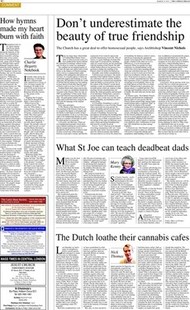Page 5, 23rd March 2012
Page 5

Report an error
Noticed an error on this page?If you've noticed an error in this article please click here to report it.
Tags
Share
Related articles
Shenouda Released
Coptic Pope Purged
Shenouda `adopted' By Amnesty
Coptic Pope To Meet Scottish Catholics
Gunmen Massacre Copts Outside Church
Patriarch Says Copts Are Afraid In Egypt
Church mourns ‘courageous’ Coptic leader
Pope Shenouda III, patriarch for more than four decades, is praised for defending rights of Christians BY STAFF REPORTER
POPE BENEDICT XVI has offered his condolences to Coptic Orthodox Christians following the death of their patriarch.
Pope Shenouda III of Alexandria, who served as patriarch of the Coptic Orthodox Church for 41 years, died last weekend at the age of 88.
In a message released at the Vatican the next day, Pope Benedict said he wanted to express his condolences and “brotherly compassion” to the bishops, priests and faithful of the Coptic Orthodox Church, which includes about 10 per cent of Egypt’s population of 82 million people.
The vast majority of Christians in Egypt belong to Pope Shenouda’s church and his four decades as patriarch often involved standing up for the rights of the country’s Christian minority and working with the Muslim majority to promote human rights and the common good.
On Tuesday tens of thousands of Christians turned up to say farewell to their patriarch at a funeral Mass at St Mark’s Cathedral, Cairo. Pope Shenouda’s body was laid in a white casket.
In his message Pope Benedict said: “The Catholic Church as a whole shares the grief that afflicts the Orthodox Copts” and Catholics pray that “the God of all mercy may receive Pope Shenouda in his joy, his peace and light”.
Maronite Catholic Patriarch Bechara Rai, who travelled from Lebanon to Egypt as part of a pastoral visit to Egypt’s 4,000 Maronite Catholics, had been scheduled to meet Pope Shenouda at 4pm that day.
Archbishop Paul Sayah, vicar general of the Maronite Patriarchate in Lebanon, said: “We were told in the morning that the meeting would not be possible because the pope’s health had deteriorated badly.” The patriarch had advanced the date of his visit to Egypt, Archbishop Sayah said, “because we knew of the state of [Pope Shenouda’s] health”.
He said that Patriarch Rai wanted “to express his solidarity with the pope in the difficult period the Christians and Egypt at large are witnessing”. The archbishop said that the patriarch also had hoped to “strengthen the ecumenical ties with all the churches in the region, with the hope also of holding a summit for the religious leaders, Christians and Muslims, in the region”.
Archbishop Sayah said Pope Shenouda “exercised very strong leadership in the Coptic Church in particular and for the Christians of Egypt in general. He was very ... courageous when it came to taking stands, vis-à-vis the government in general. He was moderate, wise and open to dialogue. In a crisis situation, he never made a rushed decision but instead would withdraw to his monastery to pray and consult before deciding. One of his famous sayings in such situations was: ‘God exists, God is here.’ “Amid the wave of attacks on the Coptic Christians recently, he took a strong stand and yet kept the doors for dialogue open. He succeeded in keeping his links with the authorities while holding together his own people. He showed both wisdom and moderation while not appearing to be weak and helpless,” Archbishop Sayah said.
Speaking to reporters, Patriarch Rai praised Pope Shenouda “as a good shepherd who led his Church ... with wisdom and care”. Pope Benedict highlighted Pope Shenouda’s 1973 visit to the Vatican where he and Pope Paul VI formally signed an agreement on Christ’s humanity and divinity, ending more than 1,500 years of disputes on the issue, and clearing the way for the formal Roman CatholicOriental Orthodox theological dialogue.
The Coptic Orthodox Church is one of the Oriental Orthodox churches that trace their origins to the Christian communities that did not accept the wording of the Council of Chalcedon in 451.
Pope Benedict also mentioned the meetings Pope Shenouda and Blessed Pope John Paul II had in Cairo in 2000. At the end of an ecumenical prayer service in Cairo, Pope Shenouda broke through the formality of the event, embracing Pope John Paul and telling him: “We love our country, and we love you!” Pope John Paul replied: “We love you, too.” From 1991 to 1998, Pope Shenouda served as one of the presidents of the World Council of Churches. In a statement March 18, the organisation’s general secretary, the Rev. Olav Fykse Tveit, said Pope Shenouda will be remembered for his ecumenical leadership and as “a strong believer in Christian-Muslim conviviality and cooperation. His initiatives in the field of interreligious dialogue contributed to the unity of the Egyptian people.” Archbishop Vincent Nichols of Westminster and Archbishop Bernard Longley of Birmingham offered their condolences to Coptic Christians in Britain.
In a statement signed by Fr Marcus Stock, general secretary of the bishops’ conference, they paid tribute to Pope Shenouda’s ecumenical commitment.
They said that the patriarch, “treasured as a dear brother” by Pope Paul VI, “was the first Coptic Orthodox Pope to visit the Holy See in over 1,500 years and signed a historic joint declaration with the Catholic Church on that occasion. “Under the strong yet gentle leadership of Pope Shenouda III, the Coptic Orthodox Church has seen a remarkable revival and growth,” the archbishops said. “He courageously defended the rights of Coptic Christians and worked tirelessly for peace and justice.”
blog comments powered by Disqus





















